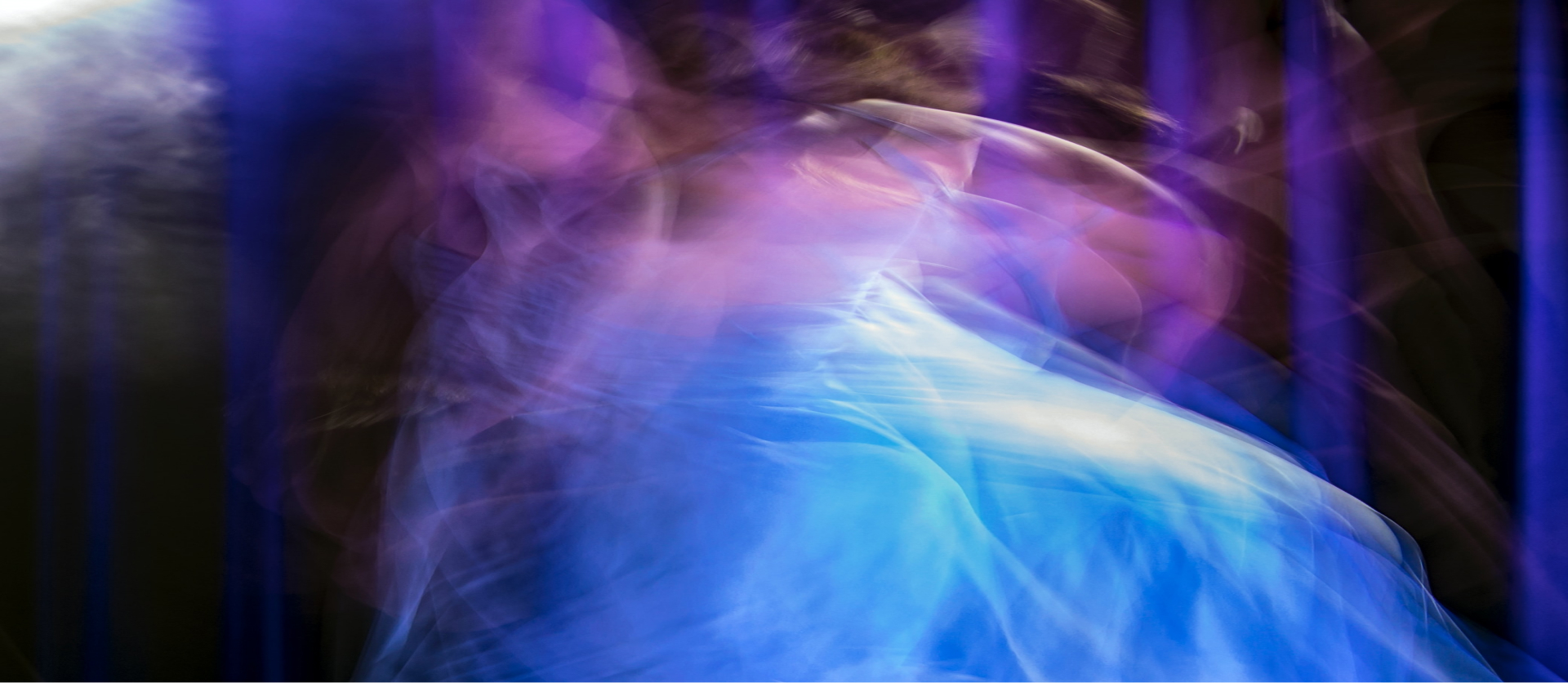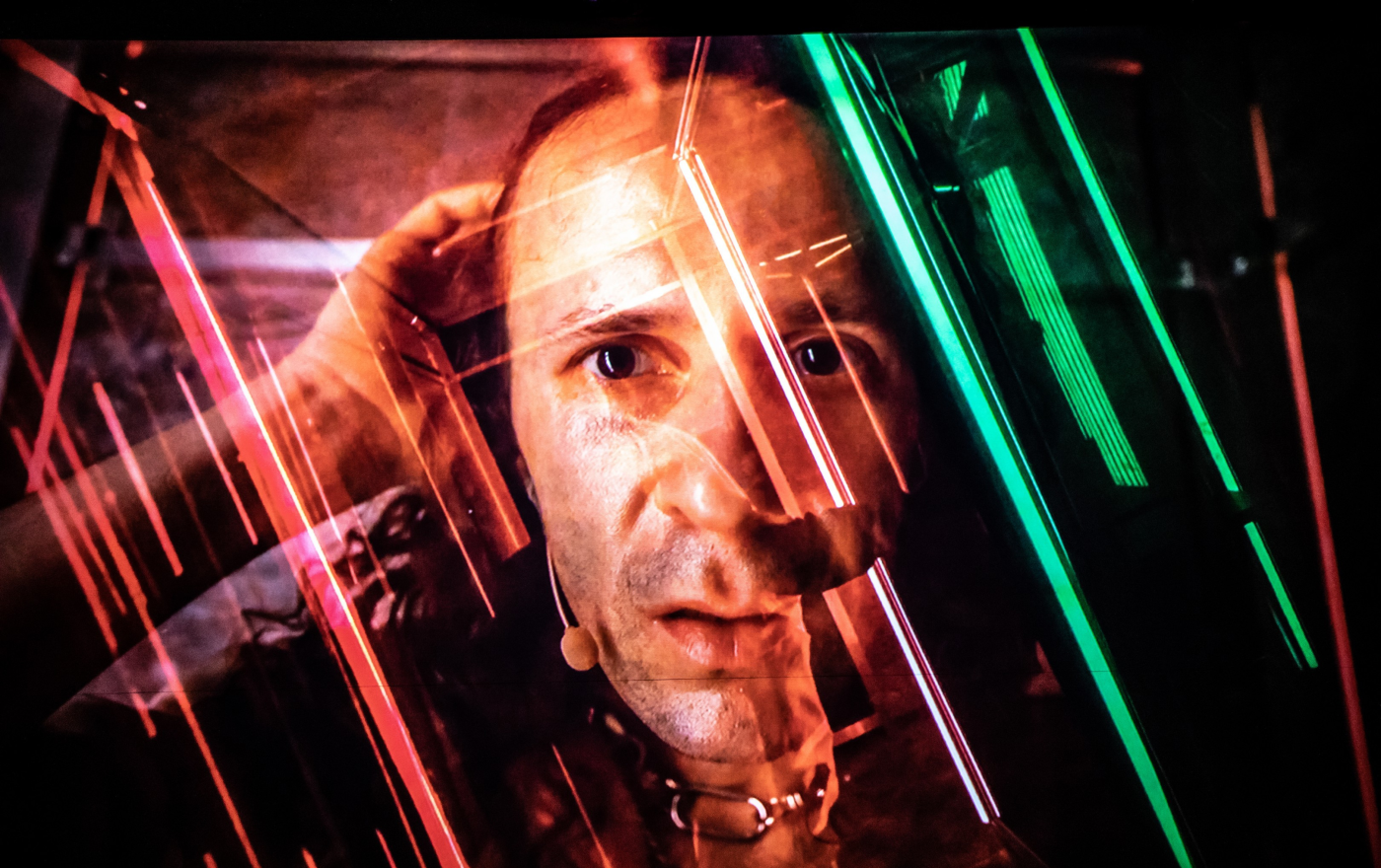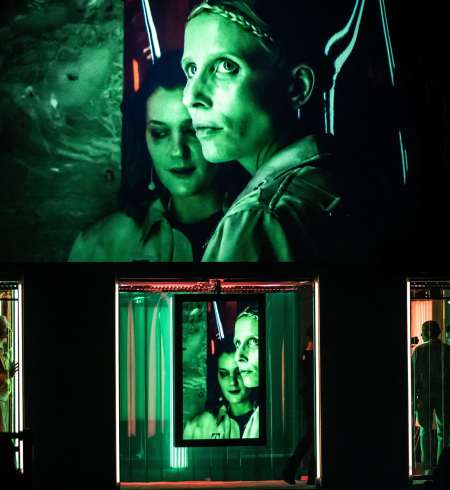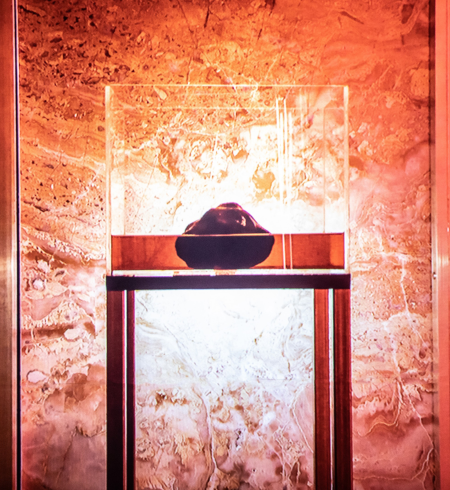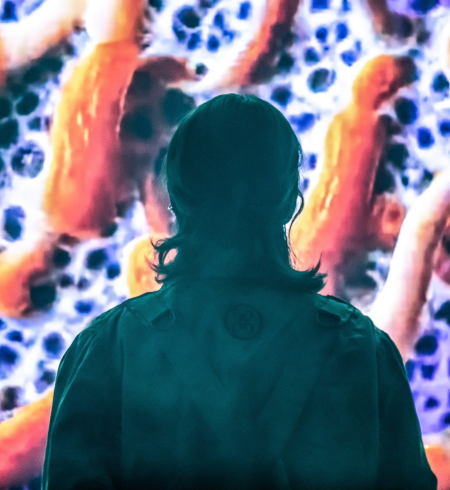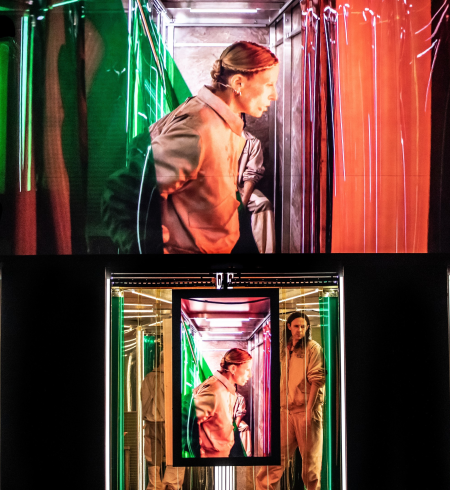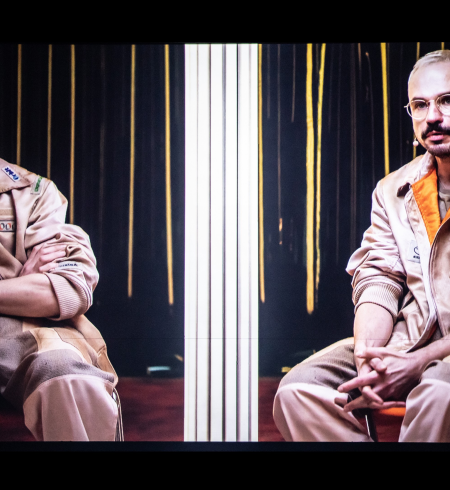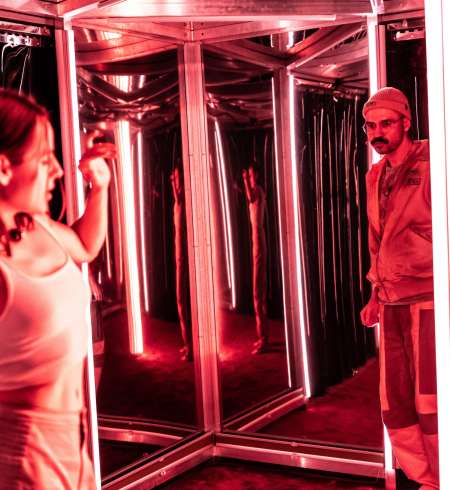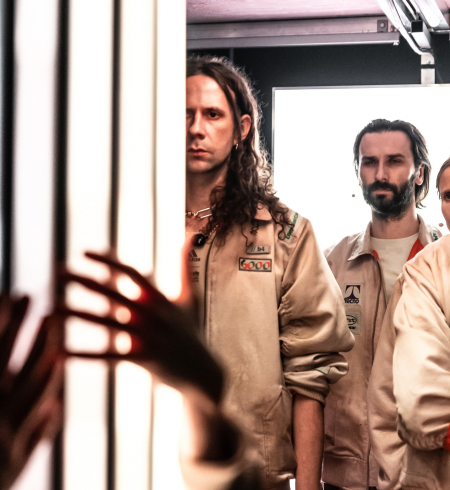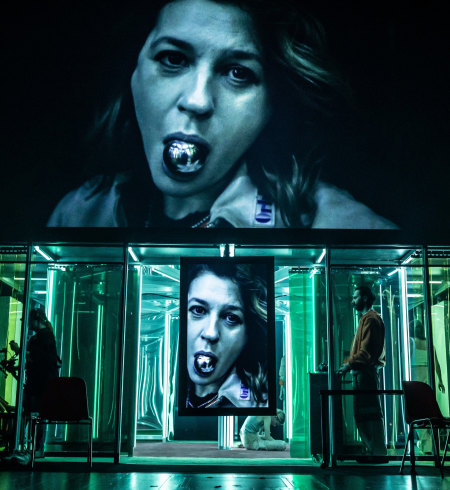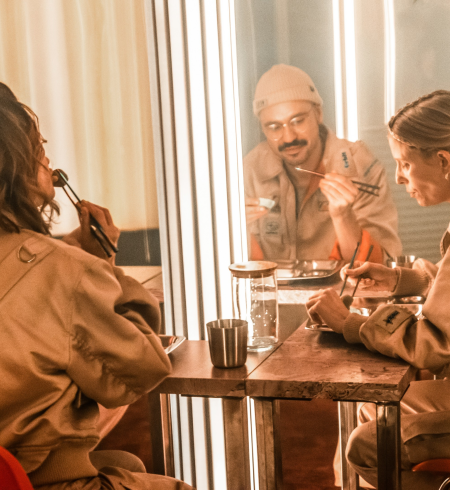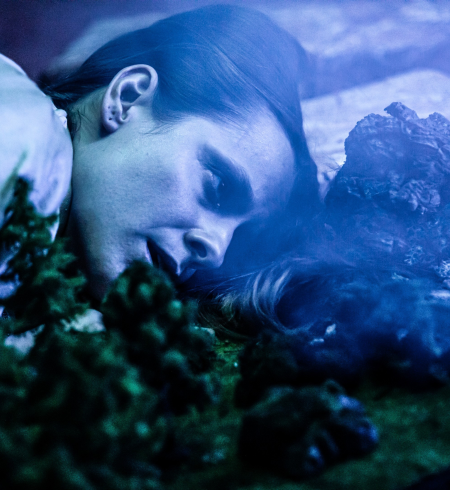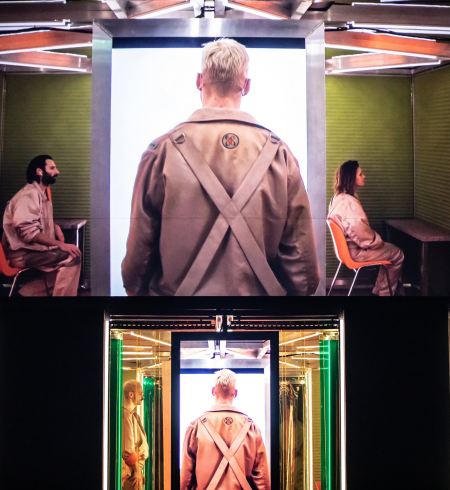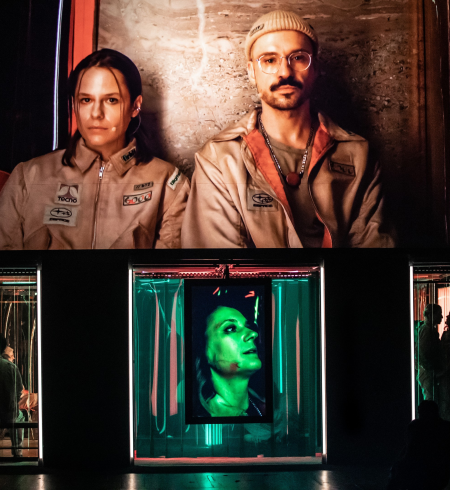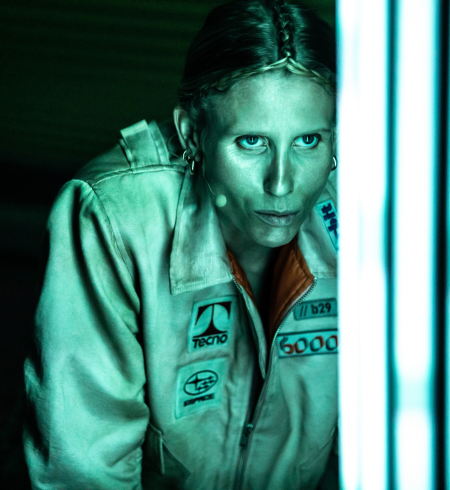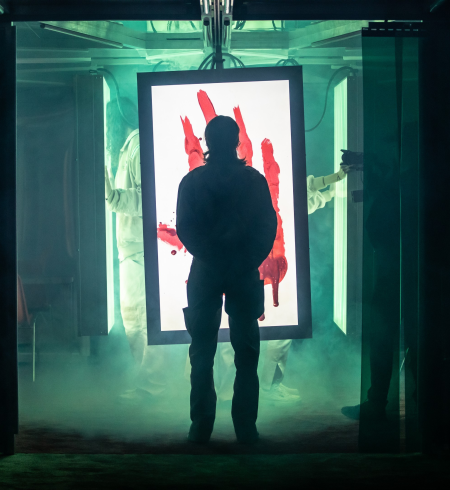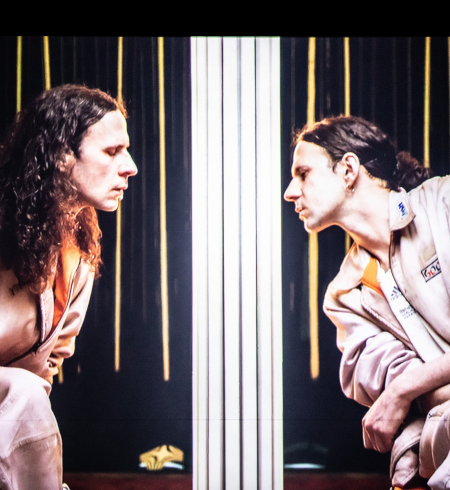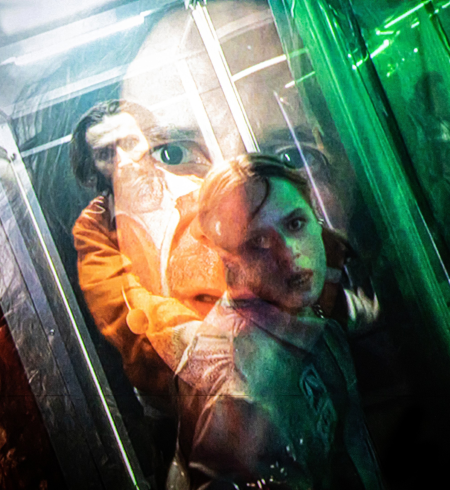.jpg)
The Employees
- Director: Lukasz Twarkowski
- Theatre:STUDIO theatregallery
- Hosting Theatre :Silk Factory Studio
- Date:
- 30 September - 20:00 hr,
- 1 October - 20:00 hr,
Olga Ravn
Director: Łukasz Twarkowski
Author: Olga Ravn
Translation from Danish: Bogusława Sochańska
Text adaptation, dramaturgy: Joanna Bednarczyk
Scenography: Fabien Lédé
Video: Jakub Lech
Lighting: Bartosz Nalazek
Costumes: Svenja Gassen
Music: Lubomir Grzelak
Movement consultation: Rob Wasiewicz
Assistant director: Adam Zduńczyk
Concept facilitation: Szymon Adamczak
Camera operators: Iwo Jabłoński, Gloria Grunig
Lighting operator: Jan Zajączkowski, Krzysztof Rykaczewski
Sound operators: Damian Kruszewski, Kacper Słowik
Video operators: Adrien Cognac, Dariusz Zabiegałowski
Production manager: Monika Balińska
Stage manager: Zuzanna Prusińska
Assistant producer: Aleksandra Urban
Model and Objects: Katarzyna Rytka
Set construction: Piotr Szczygielski
Costume creation: Aleksandra Andrychowicz
International distribution: Anna Lewanowicz
Photographer Natalia Kabanow
Duration 150 minutes, with 3 intermission
Cast:
Dominika Biernat, Daniel Dobosz, Maja Pankiewicz, Sonia Roszczuk, Miron Smagała, Paweł Smagała, Rob Wasiewicz, Małgorzata Hajewska-Krzysztofik - voice recording.
About Perfornamce:
With “The Employees”, Łukasz Twarkowski and his team continue their search for an original, multimedia theatrical form in which image, sound and action enable the audience total immersion in an unknown world. This time, it is the world of the future: on board a space ship an experiment is conducted: how will the cooperation unfold between humans and their humanoid counterparts? Both groups are under close observation and control of a mysterious Organization managing the expedition, and the audience watches their report on their relationships, work, communication and coexistence. At the time of developing AI technology, questions about human cooperating with non-human entities have never been so urgent. The play explores the nature of human consciousness as reflected in its counterpart, enhancing the feeling of the uncanny valley – this particular strangeness we experience when faced with the Other, but yet similar to the human. What is the nature of emotion? Can an algorithm experience subjective states, and feel? Is an artificially created sense of “I” a potential threat to the human species? Can there be a ghost in the shell? Thanks to the director’s incredible skill in using film image, combining a performative installation with theatrical action, and building tension between what is real and what is fantastical, know topoi from great works of science-fiction work in “The Employees” not through intellectual discourse, but by immersion in an intense, multi-sensory experience. The script of the play by Joanna Bednarczyk is based on the International Booker Prize nominated novel “The Employees” by Danish author Olga Ravn. In that compelling book
which constitutes a fresh look at the science-fiction genre, the author is interested in the relationships of the human crew with the distant and lost home planet Earth. Fragmented
testimonies provide insight into doubts concerning laborious and pointless work, conflicts within the human and non-human team, the attempt at a rebellion against the bureaucratization of their lives. Although the play is set millions of kilometres away from Earth and in a distant future – we can see the author’s dialogue with the problems of the contemporary reality – the crisis of relationships, managing emotions, and the human relationship with nature in the face of increasingly intense life in a technicized society. The audience’s freedom of movement in the space around the main stage set piece in which the actors perform, and over which the screens are mounted to broadcast the action live, allows Twarkowski to put the audience into a concert-like trance, affect all senses, and in a profoundly emotional way. Leaving the play, it is impossible to remain indifferent, and most spectators want to return to the world created by the director, his collaborators, and STUDIO actresses and actors time and time again.
REVIEWS
In Studio Theatre in Warsaw, you should definitely catch a performance of “The Employees”.
It’s a wild ride. I took a deep breath and relished Łukasz Twarkowski’s theatre. In a fragmented
narrative about people and humanoids crowded together at a space station we won’t find
answers to questions about boundaries between humans and machines. The director, once
video artist for Krystian Lupa’s plays, seduced me not with the story itself, but rather with the
theatre of the future, in which cameras, music, lights, editing, and installations are not tools,
but an integral part of the tale. The most important element are the images that consume us
entirely, and convey the present state of being lost in what is real and virtual.
Currently the hottest Polish name on international stages, Twarkowski emigrated artistically
seven years ago after the elections won by the Law and Justice party and political changes in
Teatr Polski in Wrocław and Teatr Stary in Krakow with which he had collaborated. In Warsaw,
he is presenting the laboratory of his art and thought which he executes with panache in plays
stages abroad.
If you want to see what’s new in theatre, you need to go and see “The Employees”.
Katarzyna Janowska, Newsweek
Greetings from the future
Spectacular. This word best describes everything that happened on the Studio Theatre stage
during Łukasz Twarkowski’s play “The Employees”. Spectacular are the scale of this
production, the impact it has on the audience’s senses and the way in which it incorporates
new technologies.
The questions about what theatre is and what purpose it should serve, even if we have
heard them many times, bear repeating even today. Is the perspective of emotional
immersion in a world of sensory experiences, pulsating with changing stimuli, the vision of
our theatrical future? “The Employees” explore this space, prompting us to consider the role
of aesthetic stimuli in a similar way as it was done in the equally enthusiastically received
Polish-Lithuanian production of “Rohtko” by Twarkowski, or his Lithuanian “Lokis”.
Perhaps we are now seeing the rise in the popularity of plays whose guiding principle is
emotionally affecting the audience. “The Employees” reminds us that by creating
experiences unavailable outside of the stage and auditorium, theatre is a testing ground for
various models of our being together – with others and among them.
Katarzyna Niedurny, Czas kultury
Łukasz Twarkowski, creator of big multimedia productions about contemporary times directs
an intimate science fiction drama. [...] Before we enter the space station, we should take a
closer look at what Łukasz Twarkowski proposes in theatre. He brings a fresh insight into the
wings, combining pop-cultural appeal of an ecstatic spectacle with intellectual and
emotional depth of a story about a contemporary human being.
Anna Sańczuk, VOGUE
Stage Director
ŁUKASZ TWARKOWSKI (1983) is a creator of multimedia performances combining theatre and visual arts. He places his projects in the context of extending reality through multimedia.
A crucial element of Twarkowski's creative work is investigating the ability and limitations of theatre as a medium and tool of communication. By permanent deconstruction of narratives, questioning the fixed habits of the audience and by meaningful usage of new media, Twarkowski creates a new, original language of stage performance based on multimedia and, more widely, digital technologies. In using these, Twarkowski analyses and observes increasingly complex relations between the Real, the Symbolic and the Imagined. In this area his works are innovative and at times pioneering.
In 2017 his work LOKIS premiered in the Drama Theatre in Vilnius. The performance was nominated for nine Golden Crosses of the Stage, the highest award in the field of theatre in Lithuania, and was awarded the Golden Cross for the best director.
In 2019 he directed a performance in Schauspiel Hannover, based on the cult French fairy tale Once upon a life, that was nominated by nachkritik.de for the title of best performance of 2020.
His second production in Lithuanian Drama Theatre was entitled Respublika (2020), coproduced with Munich Kammerspiele.
Respublica is a production of a remarkable breadth and form which draws the audience into action and into a closed commune; it is a very immersive play and a composition of multi-layered, alternating narratives. Łukasz Twarkowski is interested in the secrets of the contemporary mindset, as well as the changed ways of receiving and processing information, so to reach this contemporary viewer, Twarkowski chooses novel forms of theatre which merge video footage, acting, visual arts, and music. The latter is especially meaningful in Respublika.
His work Rothko (2022) won 11 nominations for the Latvian theater awards "Spēlmaņu nakts", including Best Production, Visual Artist of the Year, Composer of the Year, Choreographer of the Year, Director of the Year.
Playwrighter
Olga Ravn, The Employees: A workplace novel of the 22nd Century
In 2020 the genre of dystopian science-fiction was joined by a new title, “The Employees” by Olga Ravn, shortlisted for the International Booker Prize. In her book, planet Earth no longer exists, only memories and longing remains. Protagonists of the Danish author’s novel live on a spaceship where they are performing an unspecified task. They are divided into humans and humanoids. The crew and their superiors. Beings with a consciousness and sensuality, and beings who are only learning how to feel and use their senses.
The structure of the book consists of crew reports on how the work is going and about the relationships between humans and humanoids. Reports are fragmentary, they begin and break off at random moments. Their composition does not form a plot in a traditional sense, which aims at telling a particular story. From the scraps supplied by the author, the reader of Ravn’s book builds their own image of reality in which people long for the Earth and rebel against the frigid and bureaucracy-ridden rules governing the ship, and humanoids considered as entities devoid of typical human sensuality demand the opportunity to feel and develop their senses. The reader of “The Employees” does not always have the ability to clearly determine whether a given report is submitted by a human or a humanoid.
There are strange objects on board, artefacts left after an art exhibition which affect the crew in unexplained ways – they provide sensory stimulation which is very new for them. Spaces described by Ravn are cool, white, resembling gallery architecture. Towards the end, the ship as a form of a failed experiment transforms into a strange and macabre museum. In Ravn’s imagination, the dystopian world of humans and humanoids resembles an art gallery in which sensuality of the visitors enters uncharted lands. By playing with this juxtaposition, Ravn underlines how close art (whose most obvious foundation is imagination) is to the future in which what has been imagined in art, eventually becomes reality.
STUDIO theatregallery is an art studio, a place of creative exploration conducted by artists from various domains of art. Reaching for its avant-garde tradition, with Witkacy as its patron, Studio is a space of free expression, in which various disciplines merge: theatre, visual arts, music, film, dance. In line with the idea of the author of the Pure Form theory, creators invited to collaborate can conduct here their aesthetic experiments. Studio creates a PLACE in which you can reimagine the reality, because you want to change it. For us, the point of departure is the question about the future of artistic theatre in Poland and in Europe, and specifically, how it can defend its position in the current social, economic and political situation.

